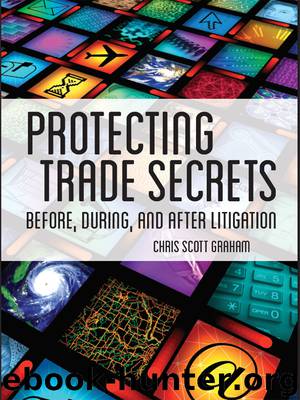Protecting Trade Secrets Before, During, and After Litigation by Chris Scott Graham

Author:Chris Scott Graham
Language: eng
Format: epub
Publisher: HarperCollins
Published: 2012-03-13T16:00:00+00:00
3. Whether to Proceed by Way of Arbitration
Trade secret cases, when they proceed by way of arbitration, most often do so as a result of an arbitration clause in a preexisting agreement between the trade secret owner and the misappropriator. On rare occasions the parties stipulate to resolve the matter through arbitration after the dispute arises. Sometimes one of the parties to an agreement containing the arbitration clause will be reluctant to proceed by way of arbitration. The plaintiff may be hesitant because discovery in arbitration is limited. The defendant may be wary of the looser evidentiary requirements of arbitration. Where only the plaintiff seeks to have the matter adjudicated by an arbitrator, a typical path is to file a complaint that sets forth the essentials of the claim and make a contemporaneous demand for arbitration with an arbitration provider. When the defendant is the only party that wishes to force the matter into arbitration, the demand for arbitration is set forth in the responsive pleading. In either case, the next step is to seek an order staying the court case pending completion of the arbitration proceedings.
As the right to compel arbitration can be waived by either party, when they engage in acts inconsistent with the right to arbitration (such as proceeding with extensive judicial discovery), the decision on whether to have the matter referred to arbitration should be made early in the proceeding. However, in trade secret cases, the earliest action can involve a request for expedited relief in the form of a temporary restraining order or a preliminary injunction. The case law in the relevant jurisdiction will provide guidance on whether seeking this relief from the court will be deemed an act inconsistent with the right to compel arbitration. If so, the client will have to decide whether to seek such relief from the court and forgo arbitration or wait until the appointment of an arbitrator and seek the same relief from that source. Consider the arbitration provision in the relevant contract, as many provide that an aggrieved party may seek preliminary equitable relief from the court notwithstanding the obligation to arbitrate any disputes arising thereunder.
Because the policy in favor of resolving disputes through arbitration is very strong, a plaintiff stands little chance of avoiding arbitration if the defendant seeks to invoke a contractual arbitration provision. But, where a choice can be made between use of arbitration or standard court proceedings, some of the factors to consider are as follows:
Will there be difficulties in gathering proof of wrongdoing or of the fact/amount of damages in a form that would be admissible under the stricter evidentiary standards applied in a court proceeding? Where the wrongdoing occurs overseas in jurisdictions that do not support efforts at compelled discovery, or when non-hearsay proof of causation requires testimony from a customer, proceeding with the arbitration is a better choice. Few businesses are eager to ask their customers to testify in these disputes, and fewer customers look forward to the process of a deposition followed by the rigors of cross-examination at trial.
Download
This site does not store any files on its server. We only index and link to content provided by other sites. Please contact the content providers to delete copyright contents if any and email us, we'll remove relevant links or contents immediately.
The Thirst by Nesbo Jo(6946)
Permanent Record by Edward Snowden(5849)
The Myth of the Strong Leader by Archie Brown(5511)
Spare by Prince Harry The Duke of Sussex(5199)
A Higher Loyalty: Truth, Lies, and Leadership by James Comey(4965)
Secrecy World by Jake Bernstein(4754)
Adulting by Kelly Williams Brown(4578)
The Borden Murders by Sarah Miller(4327)
Machine Learning at Scale with H2O by Gregory Keys | David Whiting(4314)
Killers of the Flower Moon by David Grann(4059)
American Kingpin by Nick Bilton(3890)
The Secret Barrister by The Secret Barrister(3713)
Fear by Bob Woodward(3702)
Future Crimes by Marc Goodman(3602)
The Last Girl by Nadia Murad(3513)
The House on Mango Street by Sandra Cisneros(3474)
Liar's Poker by Michael Lewis(3452)
Oathbringer (The Stormlight Archive, Book 3) by Brandon Sanderson(3222)
The Social Psychology of Inequality by Unknown(3034)
